
The Aholibah underwing is a moth of the "owlet" family Erebidae, which has over 25,000 known members, and more than that yet undescribed. Like other moths of the underwing genus (Catocala), this species has dull gray and black speckled forewings which help it blend into its surroundings, and bright orange underwings that it reveals to startle predators.

Catocala is a generally Holarctic genus of moths in the family Erebidae. The genus was erected by Franz von Paula Schrank in 1802. The moths are commonly known as underwing moths or simply underwings. These terms are sometimes used for a few related moths, but usually – especially when used in plural, not as part of a species name – they are used to refer to Catocala only.

Catocala amestris, the three-staff underwing, is a species of Catocalini that occurs in North America. It is considered endangered and is legally protected in the state of Michigan.

Catocala whitneyi, or Whitney's underwing, is a moth of the family Erebidae. The species was first described by G. M. Dodge in 1874. It is found in North America from North Dakota, Nebraska, and Kansas eastward through Wisconsin to Ohio and Tennessee. It has also been recorded as far west as Minnesota and Utah. In Canada, it has been found in Manitoba.
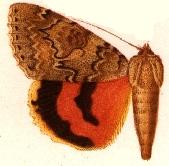
Catocala luciana, the shining underwing, is a moth of the family Erebidae. The species was first described by Herman Strecker in 1874. It is found in western North America, as far east as Minnesota and Illinois and northward into extreme southern Alberta and Saskatchewan. It occurs widely across the Great Plains, south to New Mexico, Arizona and California.
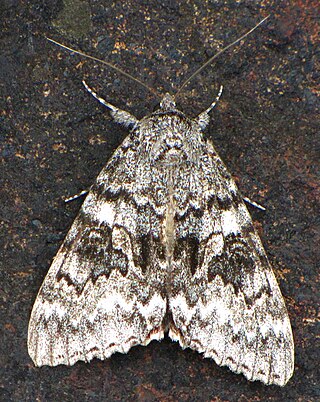
Catocala semirelicta, the semirelict underwing, is a moth of the family Erebidae. The species was first described by Augustus Radcliffe Grote in 1874. It is found in North America from Nevada, Colorado, Utah, California, and Nova Scotia south to Maine, west across Canada to British Columbia, and southward in the mountains.
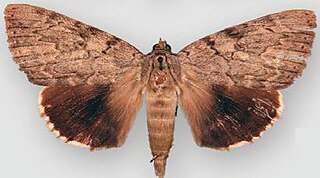
Catocala agrippina, the Agrippina underwing, is a moth of the family Erebidae. The species was first described by Herman Strecker in 1874. It is found in the United States from southern New Jersey south to Florida, west to Texas and eastern Oklahoma and north to southern Indiana.

Catocala dejecta, the dejected underwing, is a moth of the family Erebidae. It is found from Massachusetts and Connecticut south through New Jersey to Florida, west to Texas and Oklahoma and north to southern Ontario.
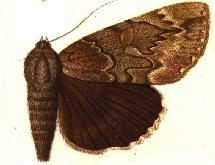
Catocala residua, the residua underwing, is a moth of the family Erebidae. The species was first described by Augustus Radcliffe Grote in 1874. It is found in North America from southern Ontario, Quebec and Maine south to North Carolina and Georgia west to Mississippi and Missouri and north to Iowa, Illinois and Michigan.

Catocala judith, or Judith's underwing, is a moth of the family Erebidae. The species was first described by Strecker in 1874. It is found in North America from southern Quebec and Ontario to the United States from New Hampshire south through Connecticut and New Jersey to North Carolina and Georgia, west to Oklahoma and Iowa and north to Wisconsin.

Catocala obscura, the obscure underwing, is a moth of the family Erebidae. The species was first described by Ferdinand Heinrich Hermann Strecker in 1873. In Canada it is found in southern Quebec and Ontario and in the United States it is found from Massachusetts and Connecticut south to North Carolina, west to Mississippi and north to Iowa, Illinois, Ohio, and Michigan.

Catocala badia, the bay underwing, bayberry underwing or old maid, is a moth of the family Erebidae. It is found from southern Maine and New Hampshire south to New York and Connecticut.

Catocala delilah, the Delilah underwing, is a moth in the family Erebidae. The species was first described by Strecker in 1874. It is found in the southern and midwestern United States, from Ohio south to Florida and west to Texas and Oklahoma.

Catocala faustina is a moth of the family Erebidae. It is found from Colorado west to California and north through Washington to British Columbia. It has also been reported in Idaho, Montana, Nevada, Oregon and Utah.

Catocala semirelicta hippolyta is a subspecies of moth of the family Erebidae first described by Strecker in 1874. It is found in the US state of California.

Catocala herodias, the Herodias underwing or Gerhard's underwing, is a moth of the family Erebidae. The species was first described by Strecker in 1876. The nominate form is found in the US states of Texas and Oklahoma. Subspecies Catocala herodias gerhardi is found from Massachusetts, Connecticut, New York to Virginia. The gerhardi subspecies is listed as endangered in Connecticut.
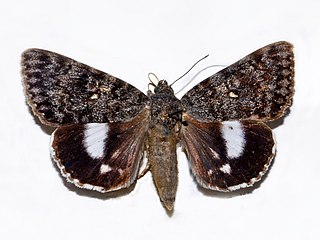
Catocala actaea is a moth of the family Erebidae first described by Rudolf Felder and Alois Friedrich Rogenhofer in 1874.

Catocala jair, the Jair underwing or Barrens underwing, is a moth of the family Erebidae. The species was first described by Strecker in 1897. It is found from the Pine Barrens of New Jersey, in the coastal plain in Bladen County, North Carolina and in the northern half of Florida.
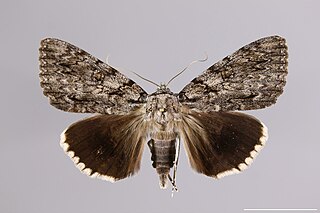
Catocala ulalume, the Ulalume underwing, is a moth of the family Erebidae. The species was first described by Herman Strecker in 1878. It is found in the United States from Virginia through Georgia to Florida, west to Texas and Oklahoma and north to Illinois.












